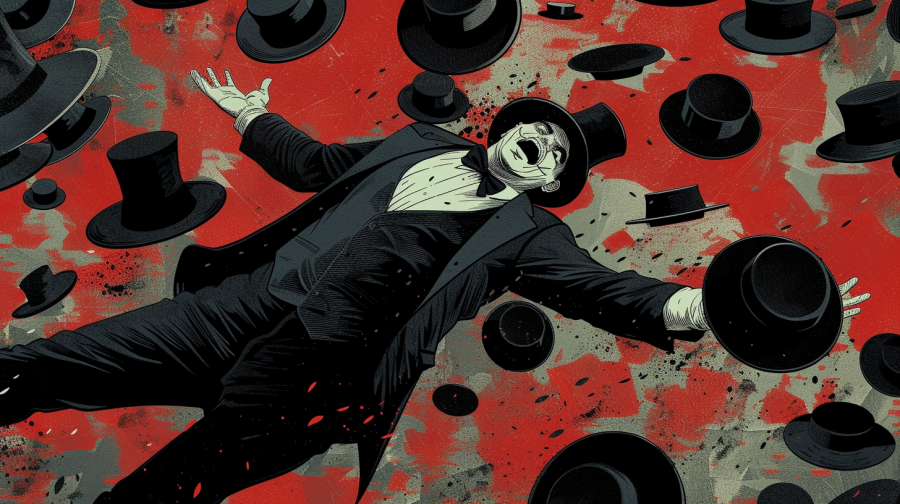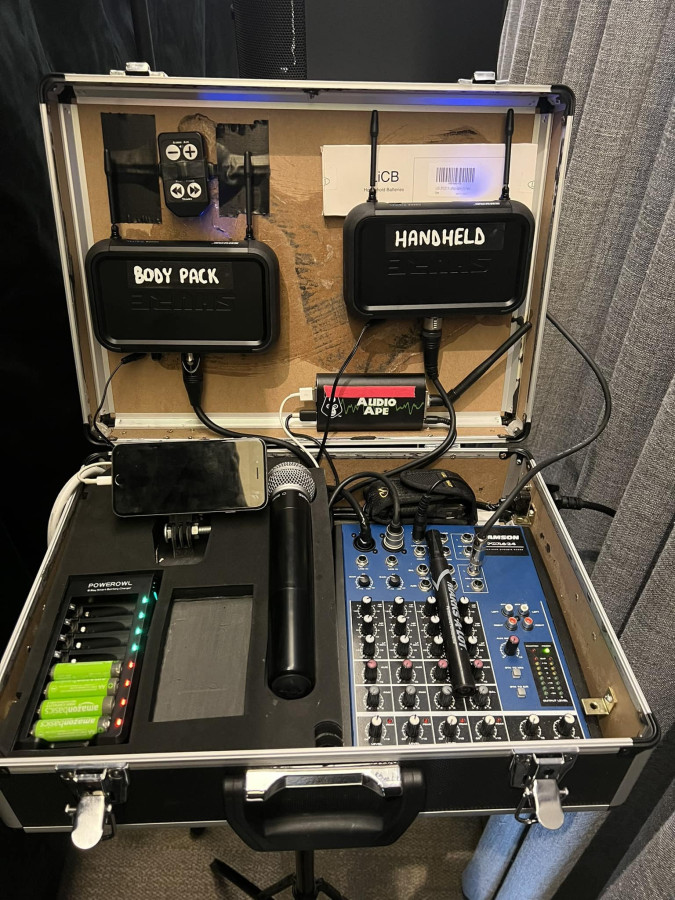Storm Before The Calm
I’m sharing some of the lessons learned, and lessons still learning, about hosting your own magic show. In particular my focus here is on “show day,” which has proven, time and time again, to be the most intense days of my life.
As a solo show producer you end up wearing many hats; each one a full-time job in itself. I’m the producer, box office manager, technical director, stage-hand, and after all that, after I’m already exhausted… I’m the performer!
It’s one thing to be able to juggle these hats in the months and weeks before the event, but on show day they all pile on. You need to be doing everything, everywhere, all at once.

I realize the theme of these tips is to do as much as you possibly can in advance, get all the ducks lined up, so on show day you get to just blow the whistle and lead the parade.
A moment of calm
My ultimate goal is to give myself an hour, or at least half-hour, of calm before the curtain rises. When the doors open and the house is let in, I hope to have nothing left to do. Everything is in its place, everything has been double-checked, and I get to relax, mingle, and focus.
Easier said than done. Show day is often an overwhelming amount of little things that need to be attended to, and the pace quickens as showtime approaches. Especially when the venue is rented by the hour, and you condense your set-up time to the bare minimum. The more you can do the day before, the better your show will be.
Pre-Set Props
You hear a lot of magicians talk about how an illusion packs flat, with hinge pins and wingnuts to break down props into the smallest case possible. I’ve got first hand experience sitting center stage in a theatre assembling the pieces of an Origami illusion. It takes a long time!
Then I started to hear from touring illusionists who talk about being able to roll an illusion off the truck and onto the stage. No assembly required. They buy bigger cases, and a bigger trailer, to save two hours of tedious work every show.
I’m no illusionist, but I still follow this wisdom. I used to pack all my props into a big case, where every square inch was crammed with something, which would then explode all over the stage, expanding into multiple tables and boxes. It’s efficient packing, but the pre-set took at least half an hour.
My goal these days is to have my packing case be my working case, with lots of air and wasted space. The props are carefully set at home, and it’s ready to go at the show as soon as I set it on a table. I don’t need to check, double-check, and triple-check that I’ve got everything un-packed properly in a frantic rush before the curtain rises.
Pre-Set Tech
In a similar vein, you can work to pre-set your technical gear. Rather than wrestling with a bunch of cables, plugging this into that, and wondering why it’s not working right, many pro magicians are removing the hassle with a dedicated tech box.
Your microphone and sound cue device just stays plugged in all the time. It’s in a self-contained case which only requires one power plug going in (or perhaps 100% battery-powered) and has one cable going out to the house speakers. (maybe two outputs so a technician can have independent control over your music and microphone.)

Problem-Solving Kit
You can pre-set all you want but you’re still going to run into surprises at the venue. Build up your own problem-solving kit of tools and materials.
I have one in my tech case full of adapters and cables. I can plug-in to any PA system built in the last 70 years. Oh, and spare batteries. I also pack a creative solutions kit which includes tools I might need to fix a thing, or quickly build something. Pliers, scissors, cutting blades, glue, tape, string, wire.
This allows you to get things done fast instead of running around yelling "My kingdom for some Scotch tape!"
Dean Hankey, a showbiz veteran who’s been there, done that, carries an event emergency kit which has grown to fill out an entire carry-on luggage case. Every time a problem needed solving he added it to his kit for next time. Not only for his own potential problems, but for those of event crew and guests. When a bride spills wine on her white dress before the photo shoot, Dean swoops in with a piece of white chalk to cover the spot. He’s the hero of the day!
Answering Questions Before They Are Asked
When you are running your own event solo, all inquiries come to you. From the venue, from volunteers, from guest performers, and from ticket buyers. The trouble is they all think of their questions on the day of the event, and you get blasted with messages when you have zero free time to answer.
I’ve learned to circumvent this with “everything you need to know” emails sent out the day before, or morning of, the big event. With some careful thought, you can answer everyone’s questions once instead of 50 times individually. I send out a message to all ticket buyers with instructions on venue parking, timing, and check-in instructions.
Of course, you can pre-write these FAQ’s long in advance and have them ready to send on the day.
Time to Get a Clock
One simple thing I do to help things run smoothly is bring my own clock. A big, bright, digital clock I can set-up in plain view from the stage so I can always know what time it is. It’s the first thing I set-up.
It lets me keep an eye on my get-ready schedule, without a stage manager running around announcing times. Many times in these big shows I’m doing brand new things to push myself and grow as an artist. I simply don’t know how long they take. During the show I can watch the clock to keep myself on track to not end too early, or too late.
Pack the Snacks
Show day itself both starts too early and ends too late. It’s a long day. (though not so long if you can use all these strategies to pre-prepare) I will often be on the run for twelve hours and forget to eat.
Snacks are a lifesaver! Not junk food, but nutrient-dense goodies that can be munched without needing to sit down. Energy bars, nuts, etc. Bananas and fruit is good for a blood-sugar boost, but I find the shelf-stable stuff is far more practical for me because I can, once again, prepare in advance!
Don’t Forget the Float
This may well be the mistake I’ve made more than any other. The float is the cash for making change at the ticket table. I would often leave this bank errand to the last minute and it sometimes slipped my mind. I have a very slippery mind.
Just like the technical gear, my best advice is to keep a dedicated cash box, with a pencil case full of money inside. At the end of the event, re-stock your float and leave it in there until the next time. No more last-minute bank runs.
However, you are still on the hook to remember to print out your ticket reservation list. This is the one and only thing on my list that must be left to the last possible minute before leaving the house. But, since I listen to all my own advice, I’ll be in a calm state of mind and have no trouble remembering, right?
Set Yourself Up For Success
Look, I’m a Professional Crastinator who often leaves things to the last minute. This article comes from my hard-earned experience of absolutely burying myself in little things needing done, and hurting my ability to put on a good show.
You’re not going to get it right every time, but try to do as much as you can in advance. It’s a kindness you can do for yourself, the other people at the event, and your audience. The more you do it, the more it becomes a system of habits, and the more you can enjoy the fun parts of hosting your own show!
Awesome advice. Greatly appreciate it.
Risk of Theft?
Doing everything by yourself has the drawback that you lack a second set of eyes. How do you deal with the risk that your case of sound equipment could disappear? Likewise the cash for change. There needs to be secure storage on site, and I doubt that locking stuff in the car is a robust solution. Good wishes.
One trustworthy box office hero!
While I get everything prepapred for them, I do have one person who helps fill the role of running the box office table at the show, since they need to be at their station at least ten minutes into the show for latecomers. They hold on to the cashbox until the show wraps up.
You must sign in to add a comment.